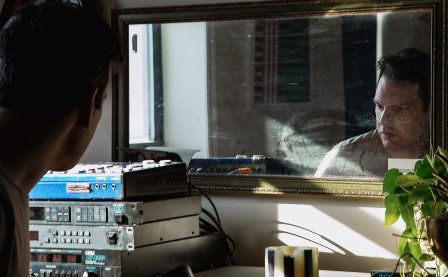There are two basic styles of minimal wave: the kind to do herky-jerky dancing to, and the kind we have in hand, the kind to mope out in your bedroom to. But wait: there are no styles of minimal wave. According to Simon Reynolds, the genre’s an invention.
As a critic, originality is an eternal question. It never goes away, but you keep writing about it. So does everyone else, from Reynolds in Retromania, to the cod-Fukuyama end-of-music catastrophe pieces that are lobbed into critical discourse with predictable regularity. So you’ll excuse me if I keep picking over the bones. Call me a broken record.
When dealing with a work that’s a clear recreation of a classic sound — in the case of Black Marble’s debut LP, it’s the minimal synthesizer music of the 80s, call it what you will — our hypothetical critic (that’s me) gives the album a spin. If the affective-aesthetic response — a response minimally-mediated by reason, in a relative sense — is negative, the piece can be panned for unoriginality. But will the same criticisms obtain when that response is one of pleasure?
The answer is a provisional no — and to lay my cards on the table, A Different Arrangement is a deeply pleasurable listening experience — but does this exercise smack of hypocrisy? And is it possible to extricate oneself when caught in a triangle formed by:
- the aforementioned retro-hating merchants of modernism (often the middlebrow position)
- a popular music industry that is postmodern inasmuch as it sheds no tears for those who actually know and recognize the original that is being pastiched, a recognition resulting either from age or music-geekiness (we’ll call this the lowbrow)
- the post- or post-post-modern perspective, which rejects out of hand the concept of originality and authenticity while valorizing recontextualization (highbrow)?
There is something to be said for the rejection of the idea of progress in music — let’s all refuse to “move forward” — but at the same time, we incur a serious loss when we abandon the idea that the original is valuable inasmuch as it’s interesting. But this value can’t hold universally; after all, there is the question of craft. Is the critique from originality rendered powerless in the face of the fact that the affective-aesthetic response is a response to craft? Or is that ‘fact’ untrue, and the response really a consequence of something less effable?
I can’t answer these questions. But in facing them, I would like to be constructive. And in this case it’s appropriate, since the synth wave visual aesthetic (even more so than other post-punk moments) was premised on the adoption of Constructivist tropes, as well as Deco propaganda and the harder edge of Futurism. The mention of Constructivism, and of Soviet propaganda, remind us to ask, with Svetlana Boym: What is the Future of Nostalgia?
This may be it; that is to say, A Different Arrangement is an album that it’s easy to say constructive things about. Speaking of craft, a lot of minimal wave revival is let down by a lack of it; tinny, atonal and repetitive synth riffs are seen as the end of the exercise. In contrast, it’s in songcraft that Black Marble shine (though that’s not to give the expectation of overt hookiness, which would miss the point, moodwise). Like much of their source material, the vocals are reminiscent of a low-key Ian Curtis — a mumbling baritone with the hint of an English accent — but appropriately, the prevailing numbness is not broken by any Curtis-esque explosions of passion. A Different Arrangement develops the sound of their earlier Weight Against The Door EP with the more overt presence of bass and guitar added to analog synth, giving a gentleness reminiscent of the underrated Frank (Just Frank), rather than the more insistent beats of groups like Xeno and Oaklander or Martial Canterel.
Here, the typically subdued tension between angular synthesizers and human melancholia is at its zenith. Let’s call it “urban pastoral”: the view of Manchester from Sheffield, seen from a bedsit window in a Brutalist towerblock, and it’s raining in both. A space that attempts to transcend home’s absence, a historical emotion. This is the sound of an invented genre, a note-perfect recreationism precisely premised on that which doesn’t exist.
More about: Black Marble



